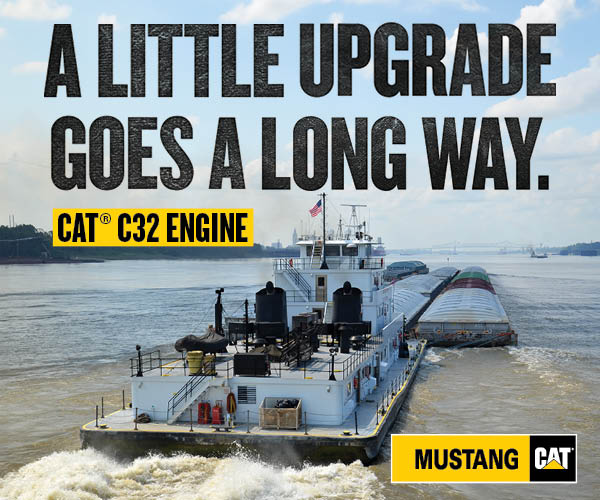Nola, Baton Rouge Get $3 Million COB Grant
With a recently-announced $3.1 million America’s Marine Highway Program grant, the ports of New Orleans (Port NOLA) and Greater Baton Rouge, along with operator SEACOR AMH, are continuing to garner support and investment from the Maritime Administration (MarAd) for their innovative container-on-barge shuttle service.
The service, which launched in 2016, repositions empty containers from Memphis, Tenn., to Baton Rouge, where they’re held at the port’s container yard on the Port Allen Canal. Petrochemical manufacturers in the area, including Shintech, Dow and Exxon, send trucks to the yard to pick up empty containers and take them to the chemical plants, where they are loaded with polyvinyl chloride (PVC) resin pellets. Resins are a booming export and are playing a major role in the Port of New Orleans’ container handling growth, which totaled 591,253 twenty-foot-equivalent units (TEUs) in 2018 (up 12.3 percent from the prior year).
After containers are loaded with resins, they are returned to the Baton Rouge container yard, where SEACOR AMH, part of Seacor Holdings Inc.’s Inland River Services Group, loads them into open hopper barges. SEACOR AMH moves the loaded containers to the Port of New Orleans twice weekly. Once in New Orleans, the containers are loaded onto deep-draft container ships for export.
As with total TEUs handled in 2018, the container-on-barge shuttle service experienced significant growth last year, surging 58 percent.
Jessica Ragusa, communications manager for Port NOLA, said the forthcoming $3.1 million MarAd grant will help ensure the shuttle service has adequate growth capacity to handle resin exports as they grow.
“Port NOLA sponsored this grant, and the funds will support the ports of Baton Rouge and New Orleans container-on-barge services, allowing for the purchase of new higher-capacity barges that will increase the efficiency of the service,” Ragusa said.
Ragusa cited a U.S. Department of Transportation study, which found there is a savings to the state of Louisiana of $118 for every 40-foot container moved by barge from Baton Rouge to New Orleans versus by truck. That’s not the only benefit, Ragusa said.
“In addition to providing an alternative logistics solution for cargo owners, the container-on-barge service also provides a benefit to the community,” she said. “Container-on-barge traffic reduces the amount of diesel emissions and congestion on surface streets and interstates that can occur on both ends of the supply chain in the surface transportation system.”
Rep. Garret Graves (R-La.) praised the grant award, which he called “the largest of such grants” awarded as part of the America’s Marine Highway Program.
“The Mississippi River is America’s global commerce superhighway, and our state’s capabilities to move product up and down the lower river is a critical link in the nation’s export/import logistics chain,” Graves said, later adding, “We have five of the top 15 ports in the country and handle up to 25 percent of all the waterborne commerce in the United States. We need to stay in front of shipping trends. This funding allows us to do that by shipping containers on our river system to other ports. The other benefit is that this service keeps the new cargo on the river—helping to alleviate traffic congestion. This grant is a win-win-win for our ports, our industry and for Louisiana drivers.”
This is just the latest in a string of grants the container-on-barge service has garnered since its inception. In late 2016, the ports received a MarAd grant that allowed them to order a barge loader and a reach stacker for the Baton Rouge container yard. A 2017-2018 Port Construction and Development Priority Program grant from the state of Louisiana will help expand the container yard in Baton Rouge.
And just last year, Port NOLA received a $2.5 million MarAd grant for adding new marine terminal handling equipment, which will boost the efficiency of loading and unloading container-laden barges in New Orleans.
According to Richard Teubner, vice president of SEACOR AMH, the service was moving 250 to 260 containers per week on average in the last half of 2018. He expected that number to surge well past 300 to perhaps 400 per week this year.



